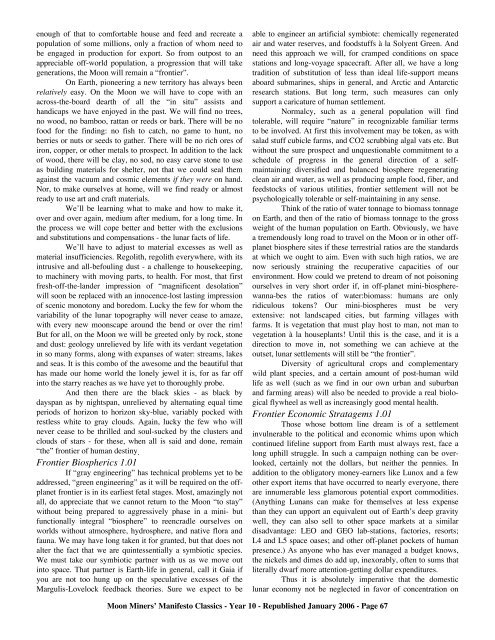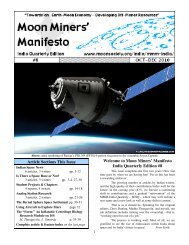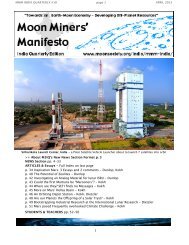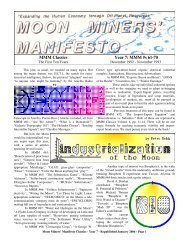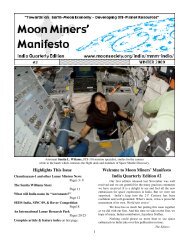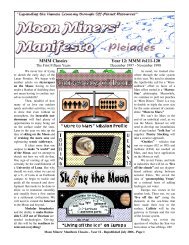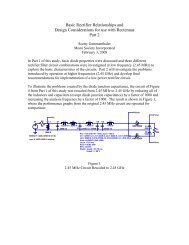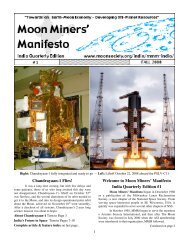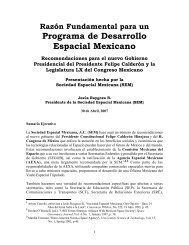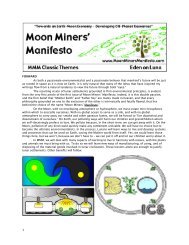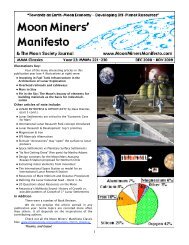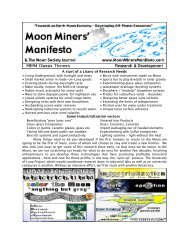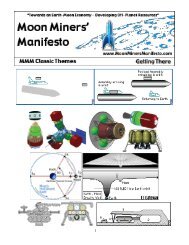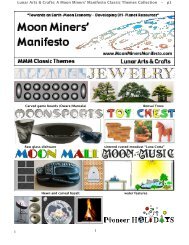MMM Classics Year 10: MMM #s 91-100 - Moon Society
MMM Classics Year 10: MMM #s 91-100 - Moon Society
MMM Classics Year 10: MMM #s 91-100 - Moon Society
Create successful ePaper yourself
Turn your PDF publications into a flip-book with our unique Google optimized e-Paper software.
enough of that to comfortable house and feed and recreate a<br />
population of some millions, only a fraction of whom need to<br />
be engaged in production for export. So from outpost to an<br />
appreciable off-world population, a progression that will take<br />
generations, the <strong>Moon</strong> will remain a “frontier”.<br />
On Earth, pioneering a new territory has always been<br />
relatively easy. On the <strong>Moon</strong> we will have to cope with an<br />
across-the-board dearth of all the “in situ” assists and<br />
handicaps we have enjoyed in the past. We will find no trees,<br />
no wood, no bamboo, rattan or reeds or bark. There will be no<br />
food for the finding: no fish to catch, no game to hunt, no<br />
berries or nuts or seeds to gather. There will be no rich ores of<br />
iron, copper, or other metals to prospect. In addition to the lack<br />
of wood, there will be clay, no sod, no easy carve stone to use<br />
as building materials for shelter, not that we could seal them<br />
against the vacuum and cosmic elements if they were on hand.<br />
Nor, to make ourselves at home, will we find ready or almost<br />
ready to use art and craft materials.<br />
We’ll be learning what to make and how to make it,<br />
over and over again, medium after medium, for a long time. In<br />
the process we will cope better and better with the exclusions<br />
and substitutions and compensations - the lunar facts of life.<br />
We’ll have to adjust to material excesses as well as<br />
material insufficiencies. Regolith, regolith everywhere, with its<br />
intrusive and all-befouling dust - a challenge to housekeeping,<br />
to machinery with moving parts, to health. For most, that first<br />
fresh-off-the-lander impression of “magnificent desolation”<br />
will soon be replaced with an innocence-lost lasting impression<br />
of scenic monotony and boredom. Lucky the few for whom the<br />
variability of the lunar topography will never cease to amaze,<br />
with every new moonscape around the bend or over the rim!<br />
But for all, on the <strong>Moon</strong> we will be greeted only by rock, stone<br />
and dust: geology unrelieved by life with its verdant vegetation<br />
in so many forms, along with expanses of water: streams, lakes<br />
and seas. It is this combo of the awesome and the beautiful that<br />
has made our home world the lonely jewel it is, for as far off<br />
into the starry reaches as we have yet to thoroughly probe.<br />
And then there are the black skies - as black by<br />
dayspan as by nightspan, unrelieved by alternating equal time<br />
periods of horizon to horizon sky-blue, variably pocked with<br />
restless white to gray clouds. Again, lucky the few who will<br />
never cease to be thrilled and soul-sucked by the clusters and<br />
clouds of stars - for these, when all is said and done, remain<br />
“the” frontier of human destiny.<br />
Frontier Biospherics 1.01<br />
If “gray engineering” has technical problems yet to be<br />
addressed, “green engineering” as it will be required on the offplanet<br />
frontier is in its earliest fetal stages. Most, amazingly not<br />
all, do appreciate that we cannot return to the <strong>Moon</strong> “to stay”<br />
without being prepared to aggressively phase in a mini- but<br />
functionally integral “biosphere” to reencradle ourselves on<br />
worlds without atmosphere, hydrosphere, and native flora and<br />
fauna. We may have long taken it for granted, but that does not<br />
alter the fact that we are quintessentially a symbiotic species.<br />
We must take our symbiotic partner with us as we move out<br />
into space. That partner is Earth-life in general, call it Gaia if<br />
you are not too hung up on the speculative excesses of the<br />
Margulis-Lovelock feedback theories. Sure we expect to be<br />
able to engineer an artificial symbiote: chemically regenerated<br />
air and water reserves, and foodstuffs à la Solyent Green. And<br />
need this approach we will, for cramped conditions on space<br />
stations and long-voyage spacecraft. After all, we have a long<br />
tradition of substitution of less than ideal life-support means<br />
aboard submarines, ships in general, and Arctic and Antarctic<br />
research stations. But long term, such measures can only<br />
support a caricature of human settlement.<br />
Normalcy, such as a general population will find<br />
tolerable, will require “nature” in recognizable familiar terms<br />
to be involved. At first this involvement may be token, as with<br />
salad stuff cubicle farms, and CO2 scrubbing algal vats etc. But<br />
without the sure prospect and unquestionable commitment to a<br />
schedule of progress in the general direction of a selfmaintaining<br />
diversified and balanced biosphere regenerating<br />
clean air and water, as well as producing ample food, fiber, and<br />
feedstocks of various utilities, frontier settlement will not be<br />
psychologically tolerable or self-maintaining in any sense.<br />
Think of the ratio of water tonnage to biomass tonnage<br />
on Earth, and then of the ratio of biomass tonnage to the gross<br />
weight of the human population on Earth. Obviously, we have<br />
a tremendously long road to travel on the <strong>Moon</strong> or in other offplanet<br />
biosphere sites if these terrestrial ratios are the standards<br />
at which we ought to aim. Even with such high ratios, we are<br />
now seriously straining the recuperative capacities of our<br />
environment. How could we pretend to dream of not poisoning<br />
ourselves in very short order if, in off-planet mini-biospherewanna-bes<br />
the ratios of water:biomass: humans are only<br />
ridiculous tokens? Our mini-biospheres must be very<br />
extensive: not landscaped cities, but farming villages with<br />
farms. It is vegetation that must play host to man, not man to<br />
vegetation à la houseplants! Until this is the case, and it is a<br />
direction to move in, not something we can achieve at the<br />
outset, lunar settlements will still be “the frontier”.<br />
Diversity of agricultural crops and complementary<br />
wild plant species, and a certain amount of post-human wild<br />
life as well (such as we find in our own urban and suburban<br />
and farming areas) will also be needed to provide a real biological<br />
flywheel as well as increasingly good mental health.<br />
Frontier Economic Stratagems 1.01<br />
Those whose bottom line dream is of a settlement<br />
invulnerable to the political and economic whims upon which<br />
continued lifeline support from Earth must always rest, face a<br />
long uphill struggle. In such a campaign nothing can be overlooked,<br />
certainly not the dollars, but neither the pennies. In<br />
addition to the obligatory money-earners like Lunox and a few<br />
other export items that have occurred to nearly everyone, there<br />
are innumerable less glamorous potential export commodities.<br />
(Anything Lunans can make for themselves at less expense<br />
than they can upport an equivalent out of Earth’s deep gravity<br />
well, they can also sell to other space markets at a similar<br />
disadvantage: LEO and GEO lab-stations, factories, resorts;<br />
L4 and L5 space oases; and other off-planet pockets of human<br />
presence.) As anyone who has ever managed a budget knows,<br />
the nickels and dimes do add up, inexorably, often to sums that<br />
literally dwarf more attention-getting dollar expenditures.<br />
Thus it is absolutely imperative that the domestic<br />
lunar economy not be neglected in favor of concentration on<br />
<strong>Moon</strong> Miners’ Manifesto <strong>Classics</strong> - <strong>Year</strong> <strong>10</strong> - Republished January 2006 - Page 67


